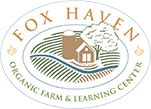Fungus Among Us Week One: Fungi Identification & Safety
On a beautiful, windy Saturday in early March, my daughter and I drove over gravel roads and narrow bridges to Fox Haven Farm for our first class in mushroom foraging. It was lovely to be returning to in-person events, and this was the perfect environment in which to do it – as natural and welcoming as anyone could wish for. We weren’t sure what to expect. We’d begun but not finished the Foraging Ethics video that is an important prerequisite to fieldwork. I should have known that the volume and depth of information in the video would be the perfect introduction to the class!

The parking lot was full, and so was the milk barn, where a large circle of chairs lined the outside of the generous room. A table in the middle held various bags and boxes of strange-looking substances with mushrooms growing on them and scattered around. We were some of the last to arrive, so another student kindly switched to make room for us to sit together.
The class began with a general welcome and introduction by Alecks. Harriet, our teacher for the series, introduced themselves and spoke about their farm and personal journey with fungus, farming, and foraging. Then we went around the circle of students, introducing ourselves. The students spoke of a wide variety of experience, knowledge and motivation. Some, like me, came with almost no prior knowledge, equipped only with curiosity about these beautiful life forms. Some were already well-seasoned foragers. Some lived on farms. One person had recently become a master naturalist. Another wanted to overcome a mistrust of wild fungi. A few had grown mushrooms; many wanted to learn how to prepare and eat them with more skill and pleasure. All of us, for whatever reason, were ready to learn.
 When Harriet began the presentation of the class material, the volume of new information brought back the excitement of being a student again. Their slides outlined an introduction to the tools and principles of safety for mushroom foraging and a chapter on ethics and awareness. A detailed section on biology and terminology followed. We learned about all the parts of a mushroom, the morphology of each part, the variations in each part between species and between individuals in a species. Harriet passed around books and examples of various species so that we could see what each of these terms looked like in person. Then they showed us a descriptive list of five species most commonly foraged in our area, and a quick intro to tree identification, which is critical for mushroom foragers because mushrooms have food preferences – just like us.
When Harriet began the presentation of the class material, the volume of new information brought back the excitement of being a student again. Their slides outlined an introduction to the tools and principles of safety for mushroom foraging and a chapter on ethics and awareness. A detailed section on biology and terminology followed. We learned about all the parts of a mushroom, the morphology of each part, the variations in each part between species and between individuals in a species. Harriet passed around books and examples of various species so that we could see what each of these terms looked like in person. Then they showed us a descriptive list of five species most commonly foraged in our area, and a quick intro to tree identification, which is critical for mushroom foragers because mushrooms have food preferences – just like us.
With the presentation finished, our hands-on learning began with a spore-print project. I’d never heard of a spore print before. Collecting spores from harvested fungi can be an aid in identification, and we all took our black paper, tape, cups, and mushrooms to create a take-home project to study the next day.
 After the project, we went outside to see some examples of fungus colonies on the farm. I’d seen all kinds of mushrooms in the woods, not knowing anything about them, so it was eye-opening to see these fungi with a new understanding of their complexity and life cycle.
After the project, we went outside to see some examples of fungus colonies on the farm. I’d seen all kinds of mushrooms in the woods, not knowing anything about them, so it was eye-opening to see these fungi with a new understanding of their complexity and life cycle.
For the next class, we’ll be learning more about how to prepare some of these wonders. Now that we know just how much can be accomplished in just a couple of hours, we’ll be prepared with a hearty appetite for both knowledge and food.

Written by:
Elizabeth Flannery germinated in Baltimore but was successfully transplanted to Frederick County where she completed the spore production phase of her life cycle. Now her pinheads are scattered around the area, happily developing into fruiting bodies of their own.
